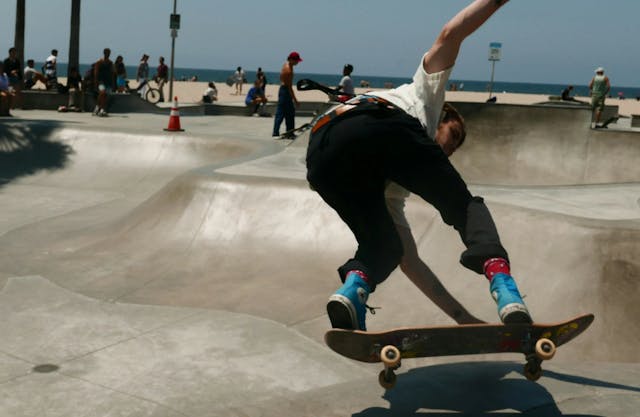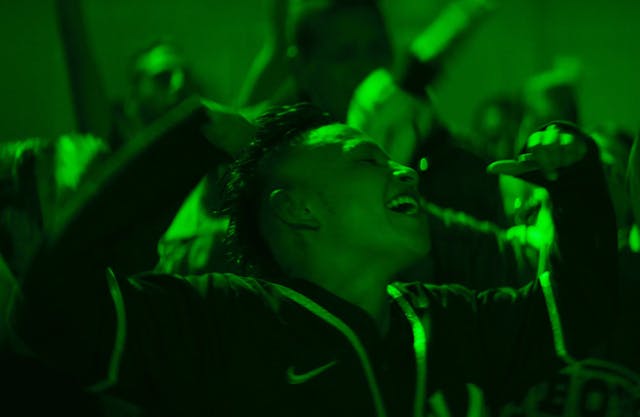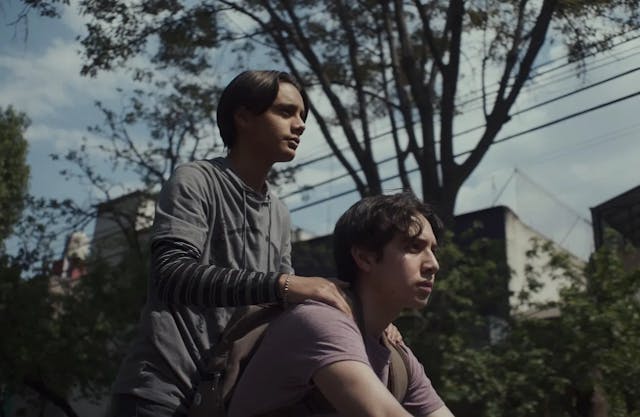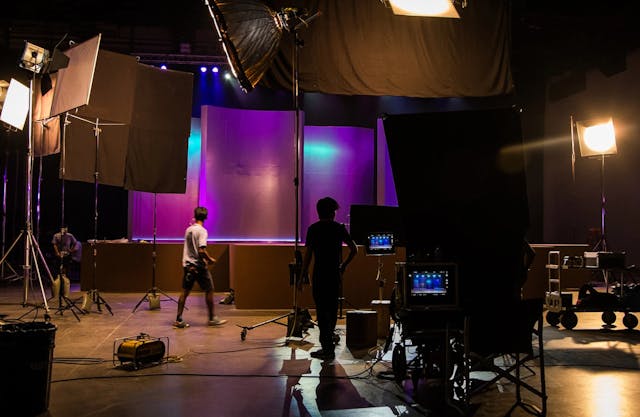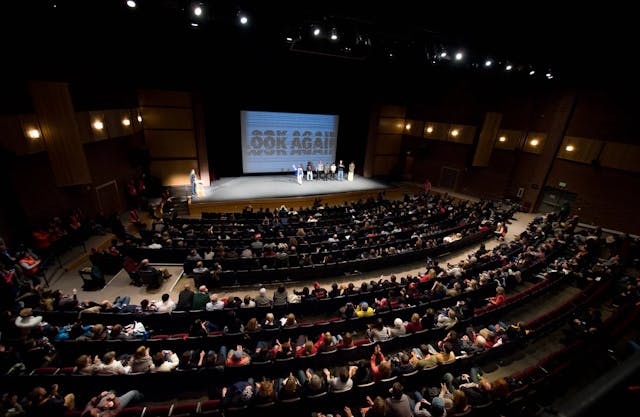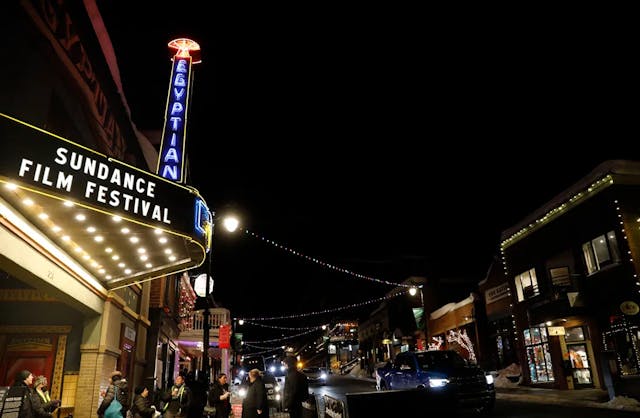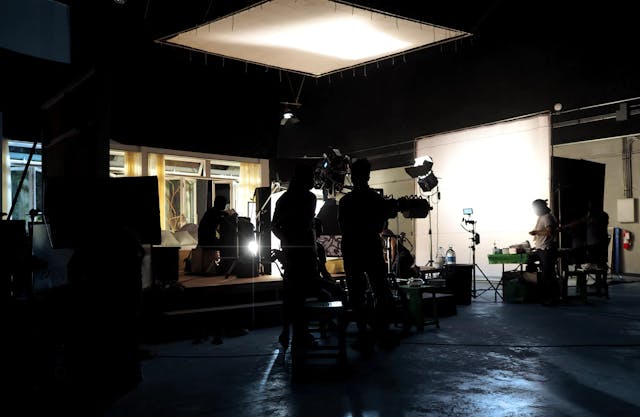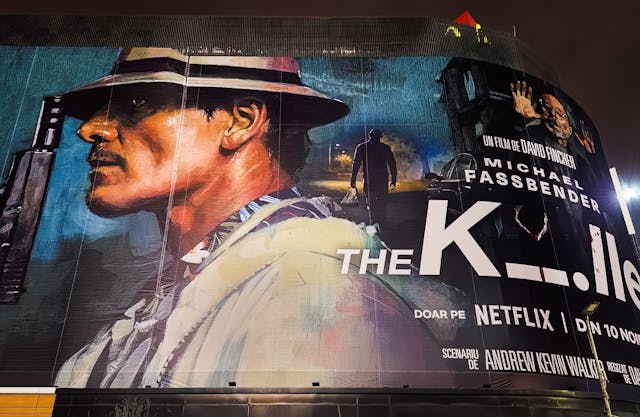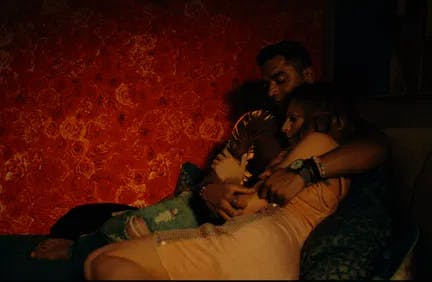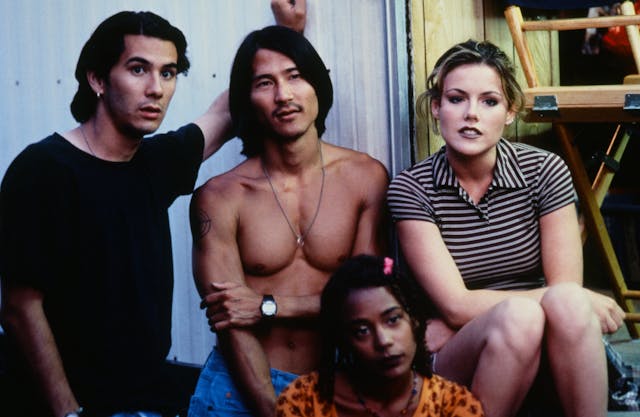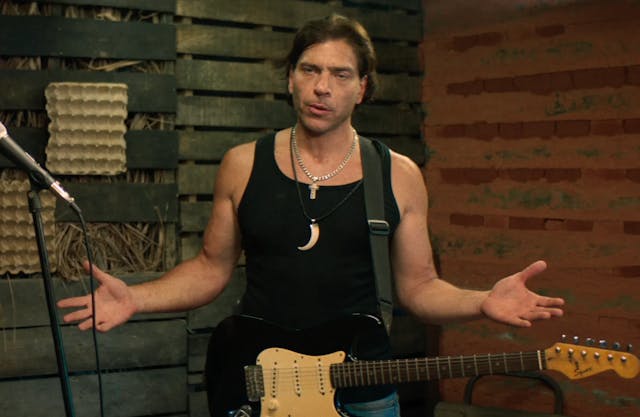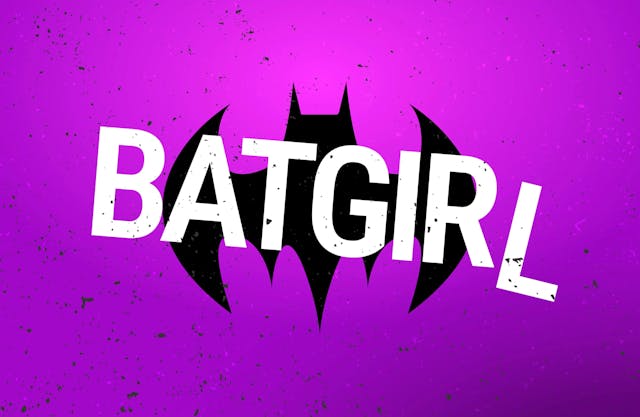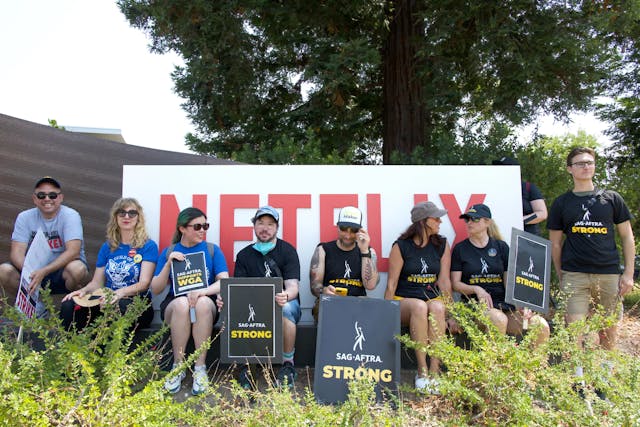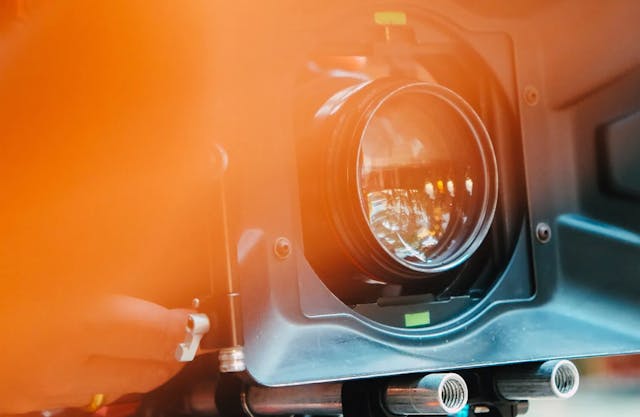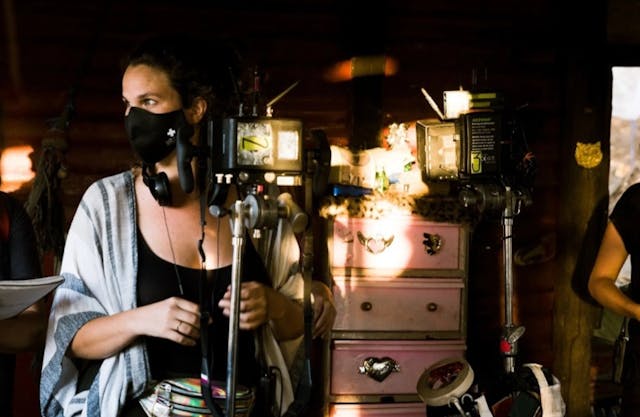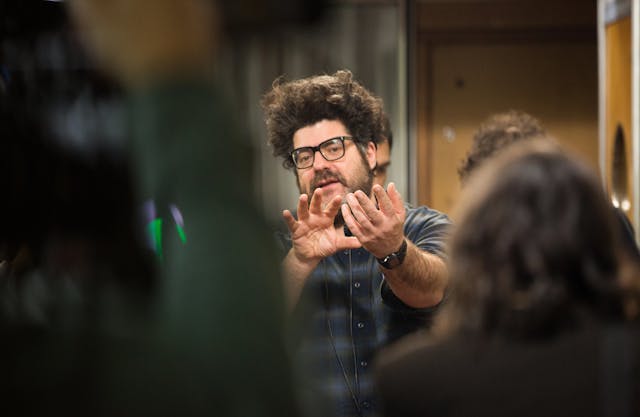Kirby McClure's "Spaghetti Junction": Indie Fantasy Movie Gets Real
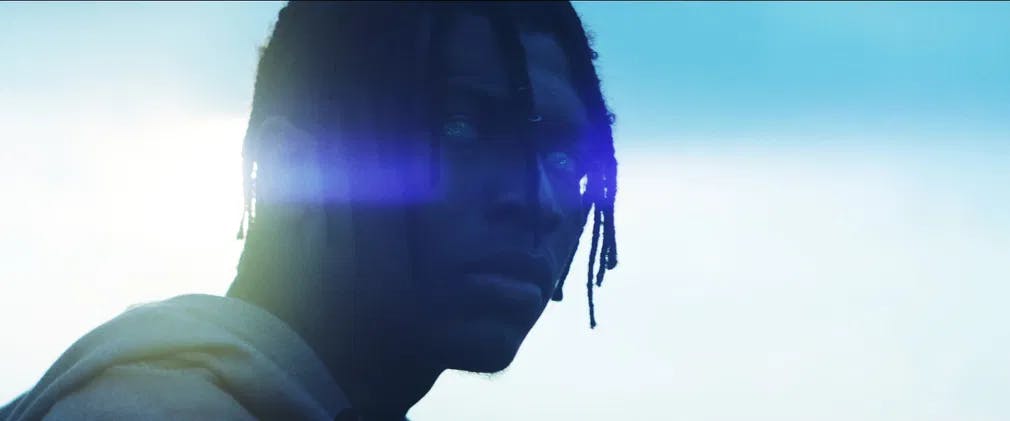
Stranded Traveler: Tyler Rainey brings a spacey presence to "Spaghetti Junction" / Photo courtesy of Radical Friend and Cardon Pictures.
Kirby McClure holds a fantastic mirror to his hometown with "Spaghetti Junction," his feature film debut opening Friday, January 5, at the Plaza Theater in Atlanta, GA. The filmmaker will attend the premiere and participate in a Q&A after the screening. The movie will play for a full week, allowing audiences to watch this new entry in the canon of cult classic movies of our time on the big screen. It's an indie film production by Radical Friend and Cardon Pictures. The team includes Executive Producer Georges Bermann, a veteran of many films and videos by Michel Gondry, including the classic "Eternal Sunshine of the Spotless Mind" (2004), and Line Producer Garrett Detrixhe.
A veteran of music videos, advertising, and video installations, McClure brings a compelling coming-of-age story about August (Cate Hughes), a teen girl struggling with the aftermath of a car accident where she lost her leg and the death of her mother. She finds companionship but little solace in her shrill older sister, Shine (Eleanore Miechkowski), who is more interested in hanging out with her bad-boy boyfriend, Antonio (Jesse Gallegos). Her father (Cam McHarg) is a nice enough man, but he can’t hold on to a job and eases the pain with booze.
August’s solitude is pierced when she encounters a strange boy in a desolate gutter hidden in a nearby forest. He claims to be The Traveler (Tyler Rainey), an other-worldly being on a mission to save the universe. Alas, he got stranded on planet Earth and needs to retrieve some stellar map from The Map Maker, who may or may not be a sinister Reverend (Butch Copeland) heading a strip mall church. Is this fantastic story happening, or are we trapped in the fantasies of a traumatized girl? You can make up your mind, catching this genre-busting drama, blessed by the solid performances of its cast and the unique, poetic vision of McClure.
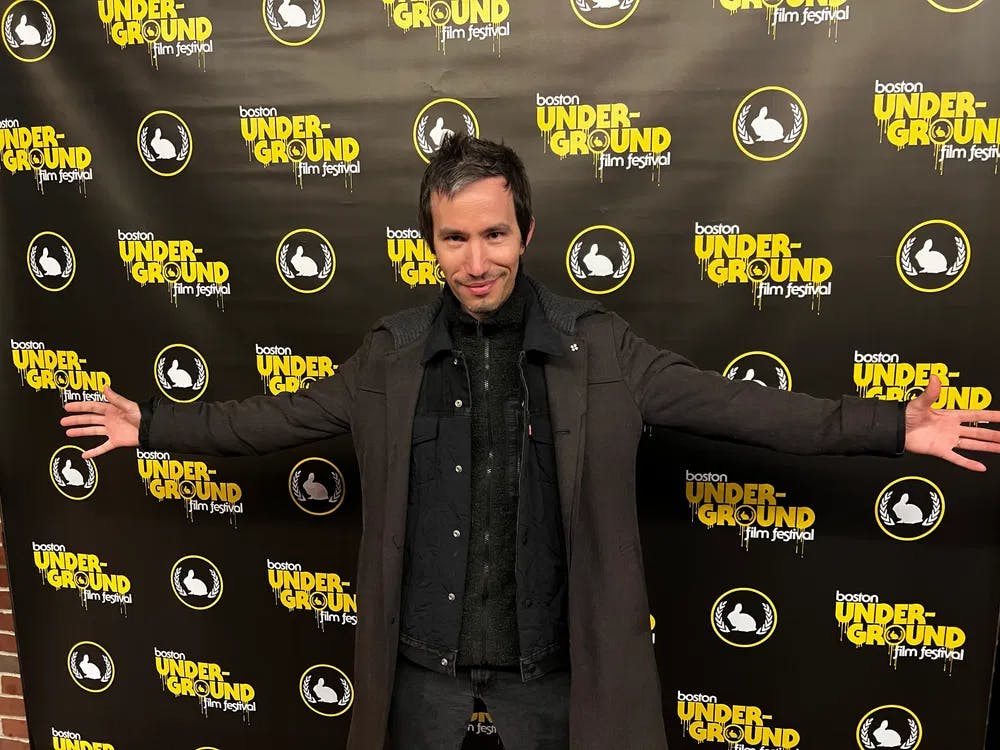
Ready for the big time: writer-director Kirby McClure at the Boston Underground Film Festival / Photo courtesy of Radical Friend and Cardon Pictures.
The Long Road to Feature Films
We spoke with McClure before the theatrical premiere of "Spaghetti Junction," about the movie's inception, the allure of filming in Atlanta, and the challenges of creating A-class work with a micro-indie project.
Popflick: Kirby, you’ve done music videos, installations, and video art. What compelled you to cross over to feature-length fiction filmmaking?
Kirby McClure: I think it was the need to tell bigger stories that could connect with people a little bit more than just in this kind of passing, visceral sort of experience that you would take checking out an installation in a museum. There's that human need to want to try and connect with people by sharing something about your dreams, history, and feelings. A story could be a way to communicate with people. It evolved from doing these brief, quick things like music videos to moving into installations. Those are like sketches of something, where you learn different ways to shoot things, characters, and certain emotions. But then, when you get the chance to tell a bigger story, all those skills and things you've explored and experimented with come up as different tools to use when you try to tell a bigger story.
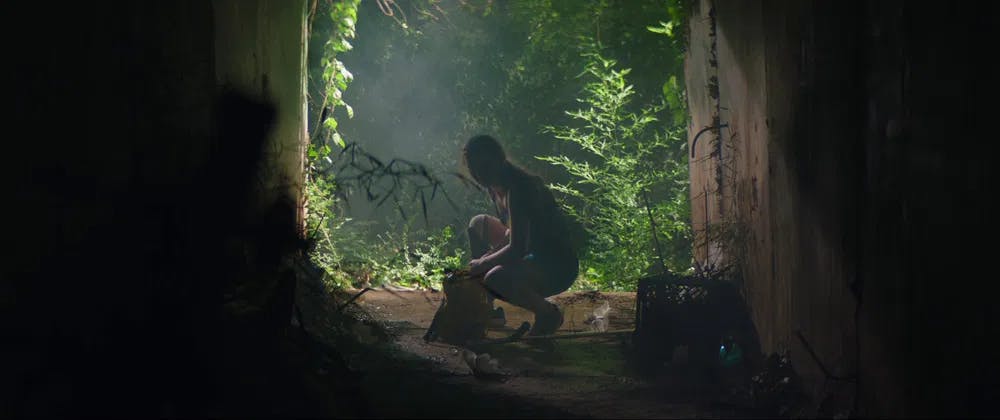
Dreamlife of traumatized girls: Cate Hugues stumbles up an otherworldly portal in "Spaghetti Junction" / Photo courtesy of Radical Friend and Cardon Pictures.
Popflick: Where does “Spaghetti Junction” come from?
Kirby McClure: It's named after a specific neighborhood right outside of Atlanta, which is this interchange of different freeways: the 285, the 85, and all of these other roads coming together. There's a neighborhood around there that also happens to be this kind of mash-up of different cultures of people, different immigrant neighborhoods. Every Asian nationality is represented in these little pockets. It's like South Asia and the deep South mixing in this interesting way up here. I went to college in Atlanta, so it was like returning home when I moved back. I had been traveling and doing different work, and I came back here with a son, living in this neighborhood. There's the metaphorical spaghetti junction, but then also the physical aspect of it. There's the constant hum and rumble of trucks, a sort of industrial noise. There's this rumble that inspired me. You can probably even hear it in the background right now!
When having breakfast with your family, you also have this ominous rumble behind everything. It adds a different layer, some subtext, to everything happening. I'm really into David Lynch's "Eraserhead" (1977). It has this big kind of cosmic rumble, which also happens here!
I was also inspired by the fact that around this area, there is this mash-up of forests. There are a lot of old, grown trees. You have fireflies at night in the summertime and gas stations and factories completely overgrown with kudzu. Nature mixed with industrial posts, vape shops, and homeless encampments. This is such an interesting backdrop for stories to take place. Also, I was reading fairy tales to my 2-year-old son. The simplicity of children's stories mixed with this crazy world turned into "Spaghetti Junction" somehow.
Finding Inspiration Back Home
Popflick: Atlanta is a very important film production hub for the movie industry. It stands in for almost any city in the United States, from New York to L.A., but rarely as itself. Were you trying to vindicate Atlanta and show it as its own city?
Kirby McClure: I don't think intentionally. I wasn't on that mission. The tax incentives have brought so many productions here. Because of that, the film industry has grown. It allows for many crew workers living here, like top-notch, top-tier crew talents working on the big Marvel movies, "Stranger Things," and all these big TV shows and films that shoot here. These productions come from LA and New York, but they never actually explore the stories of this place, you know, in the backdrop of this place. This environment is made of different immigrant cultures, and the Deep South is very interesting, with all these things coming together strangely. And it is a big part of America. It was interesting to try to tell a story that takes place here using all of those resources. The film industry based here allowed me to make a very small film with talented people based in Atlanta.
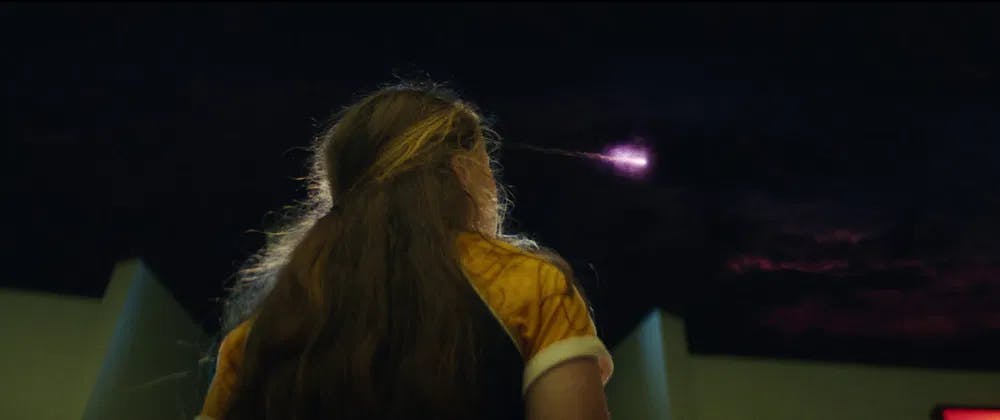
The sky is falling: Cate Hugues wishes upon a star in "Spaghetti Junction" / Photo courtesy of Radical Friend and Cardon Pictures.
Popflick: When you write your script, do you scale your creativity to the resources you know you will have, or do you let your imagination run wild and work around the limitations an indie filmmaker faces?
Kirby McClure: I think it's important not to limit yourself too much. It's funny because I'm working on a new script right now, and knowing that I'll probably still be working with a very small budget level, you do become conscious of that when you're writing. But at the same time, you also don't want to self-censor too much, too early, because then you might lose a good idea. Sometimes, you birth an idea in a way where you don't necessarily think about money. And then, you can revisit that idea and figure out how to dial it back or shift it slightly to make it more achievable.
Building Truthful Characters In a Fantasy World
Popflick: “Spaghetti Junction” is a very striking coming-of-age story with two very different and rich portrayals of young womanhood in August and her sister Shine. As a male writer, was it hard for you to get under the skin of two female characters?
Kirby McClure: I tried to make it a human story. So, it is a young woman who's dealing with a catastrophic injury and also the loss of her mother. Many of us can connect with these things regardless of gender. And in fact, it's it's pretty personal to me. Many things in August's life are based on my life. I have both legs, but that comes from a different pool of inspiration. The dynamic between sisters has accents and shades of my relationship with my sister.
Also, there's the influence and input of my wife, Julia Grigorian, who is my life and creative partner. We work together. We have directed numerous short films, installations, and music videos together. She'll have an idea and say, "Oh, you know, maybe the light should be over there." Some of the crew dudes, you know, would be like, "Yeah, I don't know…" And then I would say the same thing, and then they would respond to it and say, "Oh, that's a great idea!" And I'd say, "Well, that was her idea, man. I'm just her mouthpiece!" Luckily, that is changing a lot. So, I think it's nice to see more opportunities for female directors to tell their stories. "Spaghetti Junction" felt like a "Wizard of Oz" or "Alice in Wonderland" type of story. It needed to be centered on this female character and her connection with her father.
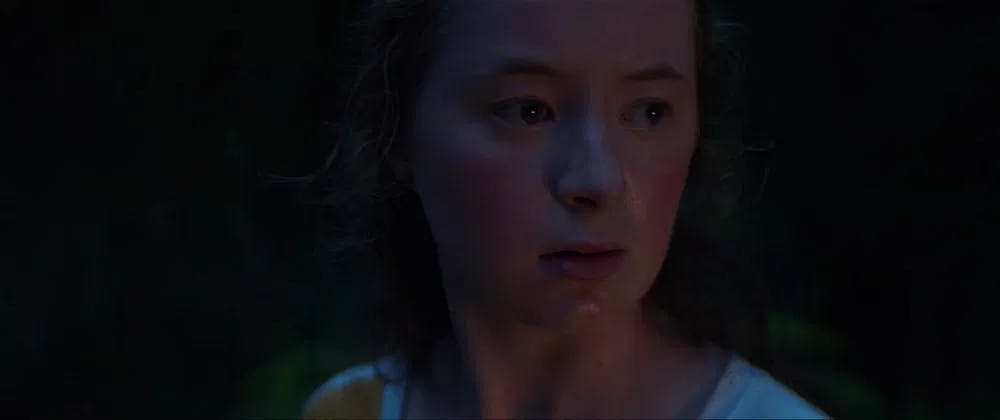
A girl called August: Cate Hugues carries "Spaghetti Junction" / Photo courtesy of Radical Friend and Cardon Pictures.
Popflick: Your main actress, Cate Hughes, is disabled, just like the character of August. Most directors would go for CGI and not look out for an actor like her. Was her casting incidental, or were you intentionally looking for a person with the actual disability?
Kirby McClure: I was! Finding August was probably the most challenging aspect of making "Spaghetti Junction." When I wrote the script, I always saw the lead being disabled in some way or another. This skateboarder inspired me in the town I come from, Jacksonville, Florida. This guy, one of my sister's friends, was a skateboarder who had one leg. He had a prosthetic leg, and he was awesome! One of the best skaters in our town. It was always inspiring, and I wondered what the path was for him. How he got to this point where he had overcome insecurities and mastered the physical adjustments to having a prosthetic leg and, you know, ripping on a skateboard. So, that was always kind of an inspiring character to me, someone who had overcome this physical challenge and then became better because of it, as opposed to it being a disability that held him back.
That was always kind of brewing in the back of my head. And, you know, sometimes you sit down and start writing, and if you're inspired or just let your brain lose things from your childhood, your subconscious and your dreams start bubbling out. This character from my hometown materialized on the page. Still, I mixed him with my sister, my life, and other inspirations I've taken along the way, like fairy tales and mythology.
When I started taking the script to different producers and agents in L.A., they would say it was interesting but like an arthouse film. It's a bit of a genre, mashing up some things in interesting ways that can make people uncomfortable. They thought we needed to get a big name, a famous actress, to secure financing. Unfortunately, no disabled actresses exist at the top tier that can bring in the funding. A lot of the feedback I was getting was, "Let's cast one of these up-and-coming actresses and then paint her leg out in post-production." That defeated the purpose of making the film because that's phony. That's not the kind of film I was looking to make.
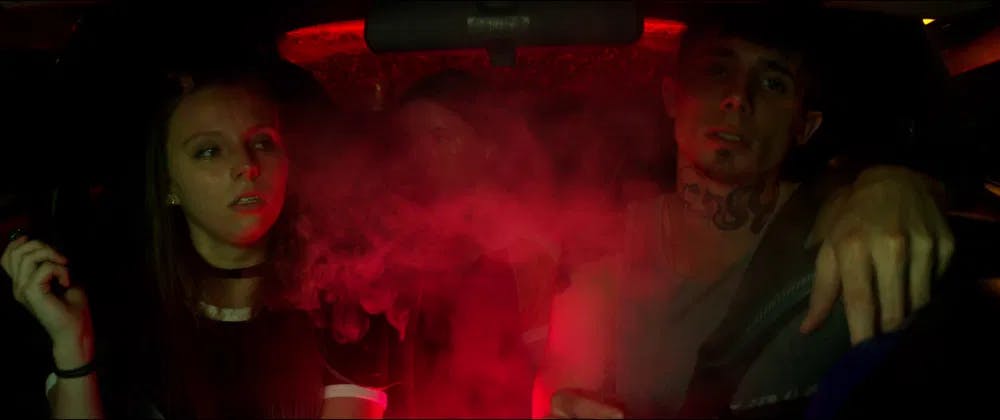
Oh, Sister!: Eleanore Miechkowski and Jesse Gallegos drive to the wild side in "Spaghetti Junction" / Photo courtesy of Radical Friend and Cardon Pictures.
I also think it's offensive to the disabled community. There are so many talented people out there, and they can play that role with authenticity. That all sounds nice, but the result was I got no financing. It would have been an easier production if there had been, you know, an actual budget, and people could have been paid properly, and we could have had more resources. It was unfortunate but fortunate as well because we had freedom. It ended up being a pretty micro-budget film, which gave us that creative freedom to cast whoever I wanted to and make the film however I wanted to. That meant stealing locations, calling in favors, and doing whatever was needed to make this work.
It was very difficult, but I wouldn't say it was alien to me. It is how I came up making films when I was 19 and 20, doing my first music videos and short films. You get used to that hustle of trying to make a project happen with few resources. I eventually got into doing bigger commercials and music videos, so it was going full circle back to my past. It was like returning to being 20 years old and trying to call in pizzas for catering from the director's chair.
Popflick: Cam McHarg plays August and Shine's dad. He's very macho and physical, yet he's the most vulnerable character in the movie. The first time we see him, he's riding the pink bike, which symbolizes femininity and girlhood. The image is both funny and incongruent. Were you trying to comment on dysfunctional masculinity?
Kirby McClure: Cam is a brilliant actor, and I hope he gets more opportunities after this movie. He went deep with me to bring this character to life. I saw the dad as being a flawed human being who is a stereotypical man. But masculinity is eating away at him because he can't be just the breadwinner. He can't be this symbol of masculinity because he has to raise two girls and cook for them. All these different things that traditionally would be considered female tasks. He must do these things, and he's also struggling with addiction, but he's doing his best. He's making lots of mistakes, but he means well. Some people wanted that character to be almost a little bit more conventional, an abusive alcoholic. But I found that there's always another side to the story. Abusive people and alcoholics they're like that for a reason, and you have to have empathy for these characters.
This guy means well. He's trying to hold it together, but society and the pressures on him are just breaking him apart. The disappearance of his daughter is a chance to prove himself. He goes on this mission to get her back. You see him just getting drunk the entire time, almost, but then, when that happens, you see him drinking coffee. Now, he's no longer on alcohol. He's on a mission. He's focused. He's going to chase his daughter. He will go wherever he has to go to get her back because he sees that as a way to redeem himself from all the bad stuff he's been doing. If he could get her back, he would have done something right.
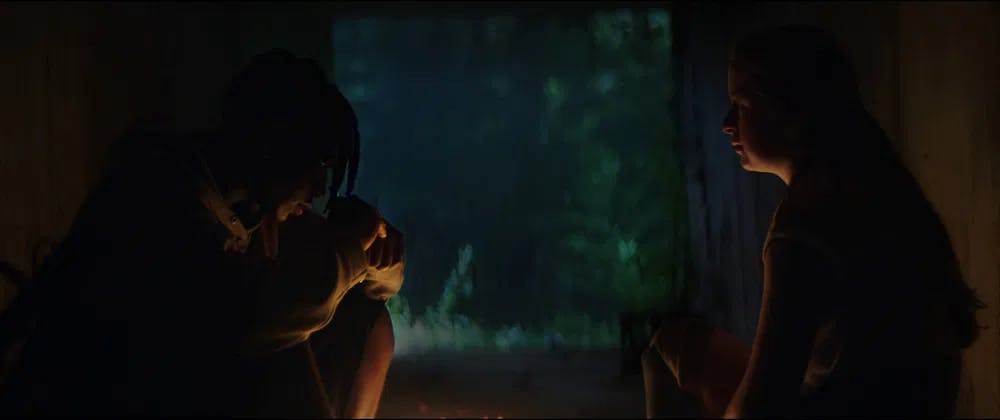
Wild fire: Rainey and Hugues come together in "Spaghetti Junction" / Photo courtesy of Radical Friend and Cardon Pictures.
Making Magic Work in the Real World
Popflick: The movie offers a vivid and clear-eyed portrait of a working-class family going through economic hardship and struggles. It has fantasy elements, but you ground this on reality. The Traveler may be an alien here, but things happen in banal locations: bus stops, warehouses, and strip malls. And it's not like a flight of fancy takes you to a magical place. Was that tension between fantasy and reality something that you were looking for?
Kirby McClure: Yeah, 100%. My favorite books and stories are grounded. I think it's the most magical when you have something that's very grounded, and then this little bit of magic starts to come in. If you're always in this fantasy world, then anything can happen. You can have flying fish and crazy stuff. But if you're at a bus stop in this rundown part of town and find out that maybe this girl is on a bus with an alien going to some portal, you can believe it's happening all around us. Like, maybe there is magic. Perhaps people mowing your lawn are connected to some cult! I think it's interesting to play with that reality around us. There could be a lot more going on.
There are subtle accents hinting at something weird under the surface, but it's never really clear if it's happening. Maybe it's all in her head, and it's just transposed from her perspective, you know, onto a bus stop or a diner where they're sharing a piece of pie. I love Haruki Murakami, the Japanese author. "The Wind-Up Bird Chronicle" and all of his books. His protagonist is a regular guy who's down on his luck, who's just trying to make dinner, and his wife disappears. And the next thing you know, he's stuck at the bottom of a well, having these weird hallucinations and hopping through time.
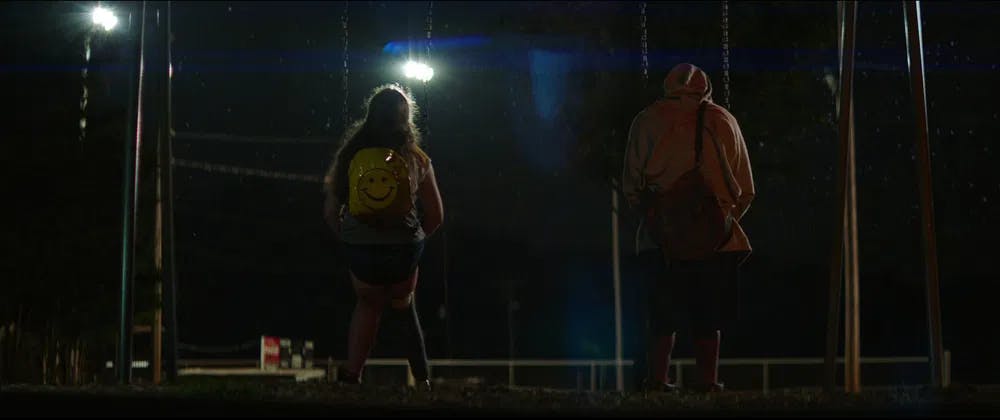
Childhood's end: Hugues and Rainey contemplate saving the universe in "Spaghetti Junction" / Photo courtesy of Radical Friend and Cardon Pictures.
Popflick: ”Spaghetti Junction” plays like a combination of sci-fi, fantasy, and social realism. Was it hard to strike a balance between those three different genres?
Kirby McClure: Honestly, no, it wasn't difficult. It felt completely natural because this story was in my head. I wanted the relationship with her dad and her sister to be happening. And then having this sort of subplot that kind of becomes the main plot on this sci-fi journey, but keeping it muted, because really, is this a parallel story, or a metaphor for what's going on in her life? It's an exercise in escapism that she's doing to get away from her family and all the problems in her life. Some people are really into that, and they're attracted to this kind of genre mash-up. But then, some people don't like that. It blurs these lines between things. That was the only way to tell the story. If you're going to make a film and put years of your life into something, why not try to poke at stuff and stir up things in a new way?
Popflick: There's also an interesting duality in your use of the environment. All these scenes are set in an urban world full of concrete and steel beams. Then, August's visions take you to forests and wilderness. We don't know if they are dreams, hallucinations, or actual messages from The Traveler. How did you get to the idea of making these contrasting realms?
Kirby McClure: I think there is this human need to pave over everything natural that we don't understand. We've protected ourselves from the animals. We've built cities with pipes and electricity to light up the nighttime, so we don't ever have to be in the darkness. And I think mystery still resides in the dark and nature and what's just beyond the freeway and the road. And as humans, that makes us afraid because that could mean being eaten by a bear or, you know, going hungry or facing things our ancestors had to face. So, I think nature still can be this place of wonder and a little bit of fear.
When you walk down the street and see the sidewalk, where weeds and grass and stuff are starting to grow up between the cracks and the concrete, there's something mysterious about that. No one has taken the time to keep fixing the concrete, and you feel this wild thing popping up and growing out of these places that are supposed to be this sterile, flat concrete. There's life there and something you don't quite understand. I love that idea of going just beyond the road. You can go into the woods and find something still dark and mysterious. Not everything is paved over and accessible on Amazon. There is still some weird stuff, and there are still mysteries out there. August goes out into the woods, and this entity lives in an old drainage tunnel overgrown with kudzu. So it's out in nature but still a piece of our world, hidden in a deep, dark place. Maybe he's a lover, or perhaps he's a monster. You don't know until later. Nature is the place where there's still a little bit of fear. We adore it, but we're also afraid of it.
Watch “Lonely”
“Lonely” is a powerful reminder that no one is ever truly alone, and there is always someone out there who cares and wants to help.
Stream NowWant to get an email when we publish new content?
Subscribe today
